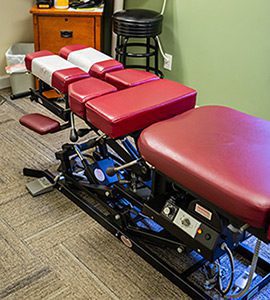What is Chiropractic Therapy?

Doctors of Chiropractic are also called chiropractors or chiropractic physicians. They usually practice a drug-free, hands-on approach to health care. This includes patient examination, diagnosis, and treatments.
The most common procedure performed by a chiropractor is known as “spinal manipulation,” or “chiropractic adjustment.” Manipulation, or adjustment of the affected areas restores motion, alleviates pain and muscle tightness, and allows tissues to heal.
In many cases, the chiropractic service may be the primary method of treatment. When other conditions also exist, chiropractic care may relieve the musculoskeletal issues. Additional types of medical treatments may also be suggested.
Chiropractors assess patients through examination, laboratory tests, x-rays, etc. Then they determine whether or not chiropractic treatment is appropriate.
Are Chiropractic Services Covered?
Medicare Part B pays for a chiropractor’s manual manipulation of the spine to correct a subluxation (when one or more of the bones of your spine move out of position). Additionally, manual devices (i.e., those that are hand-held with the device being controlled by hand) may be used by chiropractors in performing manipulation of the spine. However, no additional payment is allowed for the use of the device.
Medicare does not cover the following services performed by a chiropractor:
- Initial physical examinations
- Evaluation services
- X-Rays
- Acupuncture
- Physical therapy
- Vitamin, mineral and/or food supplements, or other supplies
- Orthopedic devices
Do I Qualify for Chiropractic Services?
Your chiropractic treatment is covered by Medicare if:
- You have had an initial physical examination for your condition
- You have an identifiable health problem in the form of a neuromusculoskeletal condition that needs treatment (such as pain, inflammation, swelling, leg and foot numbness, etc.)
- You have a subluxation or subluxation(s) of the spine
- Manual manipulation has been recommended for improvement of your condition
What Do I Pay?

Each visit must be medically necessary and enhance your condition. Once further improvement cannot reasonably be expected from continuous ongoing care, the treatment is considered supportive/preventive, and Medicare will stop paying for treatment.
How Do I Find a Qualified Chiropractor?
Always start by asking your doctor, friends, and family for recommendations. If you get your coverage from a Medicare Advantage plan, you may have to use one of the chiropractors that they have on contract. Because stringent educational and professional requirements are required for state licensure, the public is assured of academic competence and clinical experience. If Medicare directly covers you, do your homework before choosing a provider of chiropractic services. Ask the provider/supplier:
- If they are participating providers/suppliers
- If they accept assignment
- To write down what they will charge and how much of it you will have to pay
If your provider/supplier does not accept assignment:
- You may have to pay more than the Medicare-approved amount.
- You may have to pay the entire cost of your services at the time they are performed.
- You may have to bill Medicare yourself and wait several weeks before you will be reimbursed.
Other important things to know:
- If the chiropractor does not participate in Medicare, Medicare will not pay the claim.
- You must have paid your annual deductible for services and supplies before Medicare will begin to pay its share.
- You may pay little or nothing if you are covered by a Medigap/Medicare Supplemental plan. Call the plan and ask about your share of cost.
- Chiropractors will readily refer patients to the appropriate health care provider when chiropractic care is not suitable for the patient’s condition, or the condition warrants co-management in conjunction with other members of the health care team.